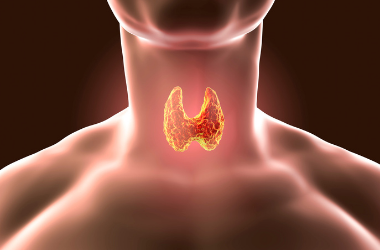Blog
Approximately 20 million Americans have thyroid disease, and the vast majority have no idea, which is why January’s Thyroid Awareness Month provides an opportunity to learn more about this common condition.
Just above your collarbone, there is a butterfly-shaped gland in your neck. That’s your thyroid. It produces thyroid hormone, which controls many activities in your body, including how fast you burn calories and how fast your heart beats, all parts of your metabolism. Diseases of the thyroid cause it to make either too much or too little of the hormone. 
Women are more likely than men to have thyroid diseases, especially right after pregnancy or menopause. Two common thyroid diseases include hypothyroidism, or underactive thyroid, and hyperthyroidism, or overactive thyroid.
Hypothyroidism slows the body’s metabolism and other functions. It is typically caused by Hashimoto’s disease, in which the immune system mistakenly attacks the thyroid until it is too damaged to produce enough hormone. Treatment usually involves a hormone replacement medication. Symptoms of hypothyroidism develop slowly, often over several years. At first, you may feel tired and sluggish. Some, but not all, symptoms you may also experience include:
- Feeling cold when other people do not
- Weight gain, even though you are not eating more food
- Feeling sad or depressed
- Pale, dry skin
- Dry, thinning hair
- Irregular menstrual bleeding
- High LDL or "bad" cholesterol, which can raise your risk for heart disease.
Hyperthyroidism causes your thyroid to make more thyroid hormone than your body needs. This speeds up many of your body's functions, like your metabolism and heart rate. The most common cause of hyperthyroidism is Graves' disease, which is an autoimmune disorder. Treatment can include medications, specialized nuclear medicine treatment, or surgical options. Some, but not all, of the symptoms of hyperthyroidism include:
- Feeling hot when other people do not
- Weight loss, even if you eat the same or more food
- Feeling nervous, anxious, or irritable
- Trembling in your hands and fingers
- Changes in your eyes that can include bulging of the eyes, redness, or irritation
- Irregular menstrual periods
- Diarrhea or more bowel movements than normal
Find more thyroid symptoms on Healthline. Additional thyroid diseases include thyroiditis, goiter, thyroid nodules, and thyroid cancer. If you experience the symptoms above or have any concerns about your thyroid, speak with your primary care provider about a referral to an endocrinologist. Saratoga Hospital Medical Group – Endocrinology provides advanced diagnostic and medical treatment for diabetes, thyroid diseases, osteoporosis, and other conditions that can affect the endocrine system. Offices are located at 665 Route 9 in Wilton and 8 Medical Park Drive in Malta.

